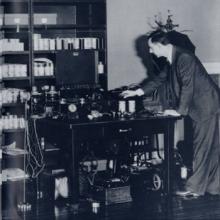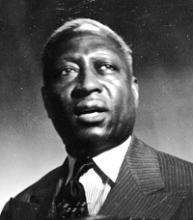inspiration + perspiration = invention :: T. Edison ::
This past weekend we opened Black Pearl Sings! at Theatre in the Park. It's my second time serving as stage manager for this play (I did so for a different theatre last year at the same time), and I'm enjoying it just as much as before.
In the play, the character Susannah Mullally works for the Library of Congress as a folklore expert, collecting songs in the 1930s. She meets the only other character, "Pearl" Johnson, while interviewing women in a Texas prison about old African American songs. Through their shared love of music these two women overcome their difference in upbringing, personality, and views to learn from each other and grow toward achieving their goals.
This story is based on the experiences of real song collectors who worked for the Archive of American Folk-Song (now part of the American Folklife Center), established by the Library of Congress in 1928. As the Center's website explains:
That year, the Librarian of Congress, Herbert Putnam (1861-1955), invited Robert Winslow Gordon (1888-1961) to become a "specialist and consultant in the field of Folk Song and Literature." Gordon was already a devoted collector of American folk music: as a Harvard student between 1906 and 1917, he conceived of a "national project" to collect the entire body of American folk music. Leaving graduate school to pursue his dream, he traveled extensively throughout the United States recording folksongs with an Edison wax-cylinder machine and supporting himself through teaching, writing, and the occasional grant. He convinced Carl Engel, the chief of the Library of Congress's Music Division, that grassroots traditions should be represented at the national library. Through his efforts, the Archive of American Folk-Song was established with private funding, and Gordon was appointed its director.

Gordon is credited with collecting over 1000 songs on Edison cylinders prior to joining the Library of Congress. He was highly interested in learning about the history of songs and what they meant for the cultures they represented, just as in the play Susannah wishes to discover a song that journeyed with slaves from Africa. She and Gordon both were heavily reliant on external funding for support of their projects (in the play, Susannah is sponsored by the Carnegie foundation).
Other important song collectors included the husband and wife partnership of John Avery Lomax and Ruby Terrill Lomax of Texas, the state Susannah travels to collect her songs. John attended Harvard's graduate program (Susannah speaks of attending Harvard classes while at a women's college) and eventually helped found a University of Texas branch of the American Folklore Society. He and his son John Jr. traveled around the state spreading the word about this project.
Ruby (John's second wife) received an MA from Columbia University and taught as an associate professor of classical languages at the University of Texas at Austin. She helped found The Delta Kappa Gamma Society International honor society for women. After marrying John Lennox she took up song collecting, meticulously recording songs not just on records but also by typing out the words and making detailed notes of the singer's speech and background.

Susannah and Pearl's relationship in the play is specifically based on John Lomax's work with Huddie William "Lead Belly" Ledbetter, a musician who, like Pearl, was discovered in prison. John and his son Alan recorded him singing and eventually helped him travel to New York, just as Susannah helps Pearl do in the play. He produced over 500 songs, some of which went on to become #1 hits when recorded by later folk groups. More information about the Lomax/Lead Belly partnership can be found at the Association for Cultural Equity, including a detailed timeline.
Other collectors included Vance Randolph, Charles Todd, Robert Sonkin, Eloise Hubbard Linscott, Zora Neale Hurston (referenced in the play), Herbert Halpert, Helen Creighton, and many, many others. The Archive grew to include not just songs but also incorporate such works as the Federal Writers' Project, a New Deal-era program to support artists, and the Ex-Slave Narrative Project (the source for another local theatre's acclaimed Let Them Be Heard).
While Black Pearl Sings! is rooted in a little appreciated part of our history, it is less based on any one person or event and more a composite of many different stories. Pearl is not merely a female Lead Belly but a person all on her own, representing the joys and trials of life as an African American woman during this time. Susanah likewise is not merely a stand in for Lomax but also draws off of his wife and the many other women seeking to gain greater opportunities in the early 20th century. Each also has their own dreams and ambitions, ones that transcend race or historical setting, anchored in family, relationships, and the fulfillment of life dreams.
Since its premiere in 2007, Black Pearl Sings! has been performed in theatres across the country. Its focus on two women and how they navigate their place is fresh, while the historical setting offers a lot for us to learn from today. It's a show I encourage more people to discover, explore, and share.





